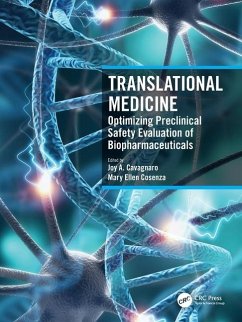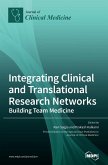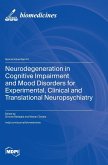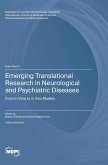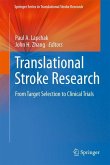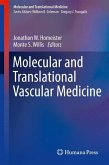Translational Medicine
Optimizing Preclinical Safety Evaluation of Biopharmaceuticals
Herausgeber: Cavagnaro, Joy A.; Cosenza, Mary Ellen
Translational Medicine
Optimizing Preclinical Safety Evaluation of Biopharmaceuticals
Herausgeber: Cavagnaro, Joy A.; Cosenza, Mary Ellen
- Broschiertes Buch
- Merkliste
- Auf die Merkliste
- Bewerten Bewerten
- Teilen
- Produkt teilen
- Produkterinnerung
- Produkterinnerung
Translational Medicine provides scientists responsible for the translation of novel biopharmaceuticals into clinical trials with a better understanding of how to navigate the obstacles that keep innovative medical research discoveries from becoming new therapies or even making it to clinical trials.
Andere Kunden interessierten sich auch für
![Integrating Clinical and Translational Research Networks-Building Team Medicine Integrating Clinical and Translational Research Networks-Building Team Medicine]() Integrating Clinical and Translational Research Networks-Building Team Medicine81,99 €
Integrating Clinical and Translational Research Networks-Building Team Medicine81,99 €![Development of Antibody-Based Therapeutics Development of Antibody-Based Therapeutics]() Development of Antibody-Based Therapeutics111,99 €
Development of Antibody-Based Therapeutics111,99 €![Neurodegeneration in Cognitive Impairment and Mood Disorders for Experimental, Clinical and Translational Neuropsychiatry Neurodegeneration in Cognitive Impairment and Mood Disorders for Experimental, Clinical and Translational Neuropsychiatry]() Neurodegeneration in Cognitive Impairment and Mood Disorders for Experimental, Clinical and Translational Neuropsychiatry88,99 €
Neurodegeneration in Cognitive Impairment and Mood Disorders for Experimental, Clinical and Translational Neuropsychiatry88,99 €![Translational Research in Audiology Translational Research in Audiology]() Translational Research in Audiology59,99 €
Translational Research in Audiology59,99 €![Emerging Translational Research in Neurological and Psychiatric Diseases Emerging Translational Research in Neurological and Psychiatric Diseases]() Emerging Translational Research in Neurological and Psychiatric Diseases164,99 €
Emerging Translational Research in Neurological and Psychiatric Diseases164,99 €![Translational Stroke Research Translational Stroke Research]() Translational Stroke Research153,99 €
Translational Stroke Research153,99 €![Molecular and Translational Vascular Medicine Molecular and Translational Vascular Medicine]() Molecular and Translational Vascular Medicine149,99 €
Molecular and Translational Vascular Medicine149,99 €-
-
-
Translational Medicine provides scientists responsible for the translation of novel biopharmaceuticals into clinical trials with a better understanding of how to navigate the obstacles that keep innovative medical research discoveries from becoming new therapies or even making it to clinical trials.
Hinweis: Dieser Artikel kann nur an eine deutsche Lieferadresse ausgeliefert werden.
Hinweis: Dieser Artikel kann nur an eine deutsche Lieferadresse ausgeliefert werden.
Produktdetails
- Produktdetails
- Verlag: CRC Press
- Seitenzahl: 544
- Erscheinungstermin: 27. Mai 2024
- Englisch
- Abmessung: 280mm x 210mm x 29mm
- Gewicht: 1314g
- ISBN-13: 9780367644451
- ISBN-10: 0367644452
- Artikelnr.: 70338940
- Herstellerkennzeichnung
- Libri GmbH
- Europaallee 1
- 36244 Bad Hersfeld
- gpsr@libri.de
- Verlag: CRC Press
- Seitenzahl: 544
- Erscheinungstermin: 27. Mai 2024
- Englisch
- Abmessung: 280mm x 210mm x 29mm
- Gewicht: 1314g
- ISBN-13: 9780367644451
- ISBN-10: 0367644452
- Artikelnr.: 70338940
- Herstellerkennzeichnung
- Libri GmbH
- Europaallee 1
- 36244 Bad Hersfeld
- gpsr@libri.de
Joy A. Cavagnaro, PhD, DABT, ATS, RAC, FRAPS is the President of Access BIO where she consults on science-based preclinical development strategies for novel drug, biologics and device combinations. She received her PhD in Biochemistry from the University of North Carolina at Chapel Hill. Her career spans academia, the CRO and biotechnology industries and government. During her tenure at CBER/FDA she was appointed to the SBRS and served as FDA's safety topic lead and rapporteur for "ICH S6." She was the first to advocate the "case-by-case" rational science-based approach to preclinical safety evaluation. In 2011 she received SOT's Biotechnology Specialty Section First Career Achievement Award and in 2019 the Society's Arnold J. Lehman Award recognizing individuals who have made significant contributions to risk assessment and/or the regulation of chemical agents, including pharmaceuticals. She is Founder and Past Chair of the leadership committee of BioSafe, an expert preclinical science committee within BIO. She is a Past Chair of the Clinical and Regulatory Affairs Committee and Translational Science & Product Development Committee of the ASGCT. She was a member of the NTP Scientific Advisory Committee on Alternative Toxicological Methods and is an advisor and member of the Grants Working Group of the California Institute of Regenerative Medicine. She serves on multiple SAB's including Odylia Therapeutics a non-profit corporation devoted to moving ultra-rare inherited retinal diseases 'from science to humans' and consults and lectures internationally on translation and risk assessment of novel therapies. She is a past chair of CRRI, an independent investigational review board and is currently a member of Advarra IRB. She has co-authored numerous white papers, articles and book chapters related to various aspects of preclinical safety assessment. The book she edited " Preclinical Safety Evaluation of Biopharmaceuticals A Science-Based Approach to Facilitating Clinical Trials" published by John Wiley & Sons, NJ, 2008, is commonly referred to as the "BioBible". Mary Ellen Cosenza, PhD, DABT, ATS, ERT, RAC is a regulatory consultant with over 30 years of senior leadership experience in the biopharmaceutical industry in the U.S., Europe, and emerging markets. Before becoming a consultant, she served as the Executive Director, U.S. Regulatory Affairs, at Amgen, Inc. During her 20-year tenure at Amgen, she led the International Emerging Markets Regulatory Department and served as an Executive Director of Global Regulatory Affairs and Safety. In addition to her leadership roles in Regulatory Affairs, she also served as the Senior Director of Toxicology at Amgen. Prior to joining Amgen, she served as a Principal Scientist for the Medical Research Division of American Cyanamid Company (now Pfizer). Mary Ellen is a founding member of BIO's BioSafe Preclinical Expert group. She was also a member of an Expert Working Group, operating under the auspices of the International Conference on Harmonization (ICH) for ICH M3(R2). She has been awarded the ACT Mildred Christian Women's Leadership in Toxicology Award (2019) and SOT's Biotechnology Specialty Section Career Achievement Award (2015). Mary Ellen is a Diplomat of the American Board of Toxicology, a Fellow of the Academy of Toxicological Sciences, member of the Society of Toxicology (SOT), Drug Information Association (DIA) and Regulatory Affairs Professional Society (RAPS) and holds Regulatory Affairs Certification for both the U.S. and EU. Mary Ellen has been an active member of the American College of Toxicology (ACT) and has served as a member of the ACT Education Committee, as Councilor, as Treasurer and President of the College. She is currently the Treasurer of the International Union of Toxicology (IUTOX). She is also an adjunct assistant professor at the University of Southern California where she teaches graduate level courses in toxicology and regulation of biologics. Mary Ellen received her PhD in Toxicology from St. John's University, New York, and her MS in Regulatory Science from the University of Southern California, Los Angeles.
1.1 Case-By-Case Approach: Historical Perspective
1.2 Selection of Relevant Animal Models/Species
1.3 Dose Extrapolation to Humans for Novel Biologics
1.4 READY, AIM, FIRE! The Importance of Strategic Drug Development Plans
1.5 Global Regulatory Expectations and Interactions
2.1 "Key Considerations in the Chemistry, Manufacturing and
Controls (CMC) of BioPharmaceuticals"
2.2 Preclinical Toxicology Testing Paradigms
2.3 Inhalation Delivery of Biologics
2.4.1 Nonclinical Considerations for Biopharmaceutical Comparability
Assessment
2.4.2 Immunogenicity of Therapeutic Proteins
2.4.3 Testing for Off-Target Binding
2.4.4 Reproductive, Developmental, & Juvenile Toxicity Assessments and
Practical Applications
2.4.5 Biosimilar Products - A Review of Past and Current Regulatory
Approval Standards for Preclinical Safety Studies
2.4.6 Nonclinical Safety Strategy for Combinations of Biopharmaceuticals or
Biopharmaceutical with Small Molecular Weight Compound
2.4.7 Due Diligence Regulatory and Preclinical focus
2.5 Regulatory Toxicology for Biopharmaceuticals: Preparing for Pre-IND
Interactions and Avoiding IND Pitfalls for Oncology and Non-Oncology
Products
2.6 Outsourcing and Monitoring Preclinical Studies Including GLP
Considerations
3.1 Nonclinical Development of Peptides and Therapeutic Proteins
3.2 Antibodies (Abs) and Related Products Containing Complementarity
Determining Regions (CDRs)
3.3 Nonclinical Safety Evaluation of Therapies for Rare Diseases
3.4 Development of Antibody Drug Conjugates
3.5 Preventive and Therapeutic Vaccines
3.6 Understanding the Nonclinical Safety Considerations for Therapeutic
Oligonucleotides
3.7 Cellular-based Therapies
3.8 Considerations in the Preclinical Development of Gene Therapy Products
3.9 Genome-Editing Technologies
4.1 Nonclinical Development of Anti-Cancer Biotherapeutics
4.2 Non-Clinical Safety Evaluation of Immunomodulatory Biological
Therapeutics for the Treatment of Immune-Mediated Diseases
4.3 Nonclinical Safety Program Considerations for Biologic Therapeutics for
Neurodegenerative Conditions
4.4 Nonclinical Development of Biologics for Infectious Diseases
1.2 Selection of Relevant Animal Models/Species
1.3 Dose Extrapolation to Humans for Novel Biologics
1.4 READY, AIM, FIRE! The Importance of Strategic Drug Development Plans
1.5 Global Regulatory Expectations and Interactions
2.1 "Key Considerations in the Chemistry, Manufacturing and
Controls (CMC) of BioPharmaceuticals"
2.2 Preclinical Toxicology Testing Paradigms
2.3 Inhalation Delivery of Biologics
2.4.1 Nonclinical Considerations for Biopharmaceutical Comparability
Assessment
2.4.2 Immunogenicity of Therapeutic Proteins
2.4.3 Testing for Off-Target Binding
2.4.4 Reproductive, Developmental, & Juvenile Toxicity Assessments and
Practical Applications
2.4.5 Biosimilar Products - A Review of Past and Current Regulatory
Approval Standards for Preclinical Safety Studies
2.4.6 Nonclinical Safety Strategy for Combinations of Biopharmaceuticals or
Biopharmaceutical with Small Molecular Weight Compound
2.4.7 Due Diligence Regulatory and Preclinical focus
2.5 Regulatory Toxicology for Biopharmaceuticals: Preparing for Pre-IND
Interactions and Avoiding IND Pitfalls for Oncology and Non-Oncology
Products
2.6 Outsourcing and Monitoring Preclinical Studies Including GLP
Considerations
3.1 Nonclinical Development of Peptides and Therapeutic Proteins
3.2 Antibodies (Abs) and Related Products Containing Complementarity
Determining Regions (CDRs)
3.3 Nonclinical Safety Evaluation of Therapies for Rare Diseases
3.4 Development of Antibody Drug Conjugates
3.5 Preventive and Therapeutic Vaccines
3.6 Understanding the Nonclinical Safety Considerations for Therapeutic
Oligonucleotides
3.7 Cellular-based Therapies
3.8 Considerations in the Preclinical Development of Gene Therapy Products
3.9 Genome-Editing Technologies
4.1 Nonclinical Development of Anti-Cancer Biotherapeutics
4.2 Non-Clinical Safety Evaluation of Immunomodulatory Biological
Therapeutics for the Treatment of Immune-Mediated Diseases
4.3 Nonclinical Safety Program Considerations for Biologic Therapeutics for
Neurodegenerative Conditions
4.4 Nonclinical Development of Biologics for Infectious Diseases
1.1 Case-By-Case Approach: Historical Perspective
1.2 Selection of Relevant Animal Models/Species
1.3 Dose Extrapolation to Humans for Novel Biologics
1.4 READY, AIM, FIRE! The Importance of Strategic Drug Development Plans
1.5 Global Regulatory Expectations and Interactions
2.1 "Key Considerations in the Chemistry, Manufacturing and
Controls (CMC) of BioPharmaceuticals"
2.2 Preclinical Toxicology Testing Paradigms
2.3 Inhalation Delivery of Biologics
2.4.1 Nonclinical Considerations for Biopharmaceutical Comparability
Assessment
2.4.2 Immunogenicity of Therapeutic Proteins
2.4.3 Testing for Off-Target Binding
2.4.4 Reproductive, Developmental, & Juvenile Toxicity Assessments and
Practical Applications
2.4.5 Biosimilar Products - A Review of Past and Current Regulatory
Approval Standards for Preclinical Safety Studies
2.4.6 Nonclinical Safety Strategy for Combinations of Biopharmaceuticals or
Biopharmaceutical with Small Molecular Weight Compound
2.4.7 Due Diligence Regulatory and Preclinical focus
2.5 Regulatory Toxicology for Biopharmaceuticals: Preparing for Pre-IND
Interactions and Avoiding IND Pitfalls for Oncology and Non-Oncology
Products
2.6 Outsourcing and Monitoring Preclinical Studies Including GLP
Considerations
3.1 Nonclinical Development of Peptides and Therapeutic Proteins
3.2 Antibodies (Abs) and Related Products Containing Complementarity
Determining Regions (CDRs)
3.3 Nonclinical Safety Evaluation of Therapies for Rare Diseases
3.4 Development of Antibody Drug Conjugates
3.5 Preventive and Therapeutic Vaccines
3.6 Understanding the Nonclinical Safety Considerations for Therapeutic
Oligonucleotides
3.7 Cellular-based Therapies
3.8 Considerations in the Preclinical Development of Gene Therapy Products
3.9 Genome-Editing Technologies
4.1 Nonclinical Development of Anti-Cancer Biotherapeutics
4.2 Non-Clinical Safety Evaluation of Immunomodulatory Biological
Therapeutics for the Treatment of Immune-Mediated Diseases
4.3 Nonclinical Safety Program Considerations for Biologic Therapeutics for
Neurodegenerative Conditions
4.4 Nonclinical Development of Biologics for Infectious Diseases
1.2 Selection of Relevant Animal Models/Species
1.3 Dose Extrapolation to Humans for Novel Biologics
1.4 READY, AIM, FIRE! The Importance of Strategic Drug Development Plans
1.5 Global Regulatory Expectations and Interactions
2.1 "Key Considerations in the Chemistry, Manufacturing and
Controls (CMC) of BioPharmaceuticals"
2.2 Preclinical Toxicology Testing Paradigms
2.3 Inhalation Delivery of Biologics
2.4.1 Nonclinical Considerations for Biopharmaceutical Comparability
Assessment
2.4.2 Immunogenicity of Therapeutic Proteins
2.4.3 Testing for Off-Target Binding
2.4.4 Reproductive, Developmental, & Juvenile Toxicity Assessments and
Practical Applications
2.4.5 Biosimilar Products - A Review of Past and Current Regulatory
Approval Standards for Preclinical Safety Studies
2.4.6 Nonclinical Safety Strategy for Combinations of Biopharmaceuticals or
Biopharmaceutical with Small Molecular Weight Compound
2.4.7 Due Diligence Regulatory and Preclinical focus
2.5 Regulatory Toxicology for Biopharmaceuticals: Preparing for Pre-IND
Interactions and Avoiding IND Pitfalls for Oncology and Non-Oncology
Products
2.6 Outsourcing and Monitoring Preclinical Studies Including GLP
Considerations
3.1 Nonclinical Development of Peptides and Therapeutic Proteins
3.2 Antibodies (Abs) and Related Products Containing Complementarity
Determining Regions (CDRs)
3.3 Nonclinical Safety Evaluation of Therapies for Rare Diseases
3.4 Development of Antibody Drug Conjugates
3.5 Preventive and Therapeutic Vaccines
3.6 Understanding the Nonclinical Safety Considerations for Therapeutic
Oligonucleotides
3.7 Cellular-based Therapies
3.8 Considerations in the Preclinical Development of Gene Therapy Products
3.9 Genome-Editing Technologies
4.1 Nonclinical Development of Anti-Cancer Biotherapeutics
4.2 Non-Clinical Safety Evaluation of Immunomodulatory Biological
Therapeutics for the Treatment of Immune-Mediated Diseases
4.3 Nonclinical Safety Program Considerations for Biologic Therapeutics for
Neurodegenerative Conditions
4.4 Nonclinical Development of Biologics for Infectious Diseases

